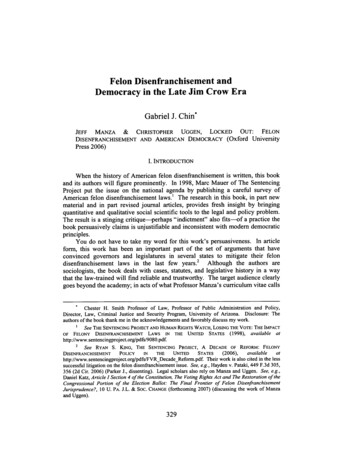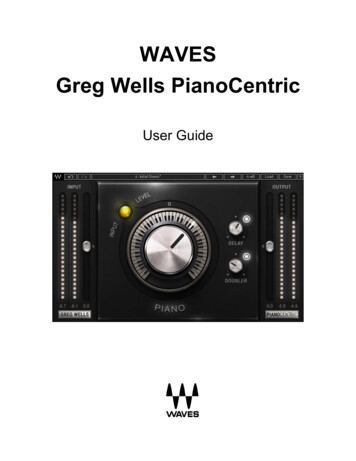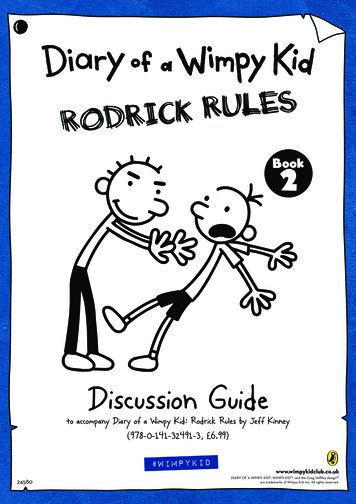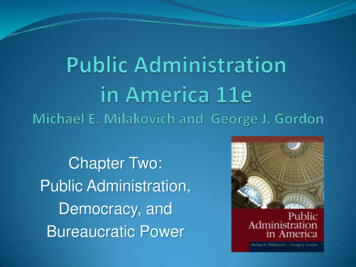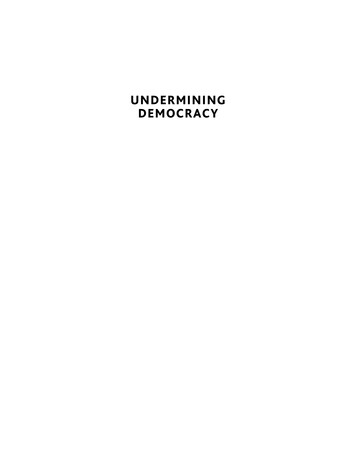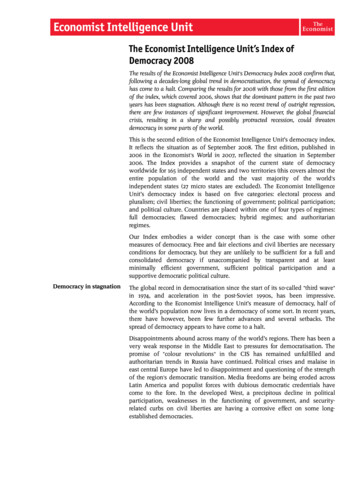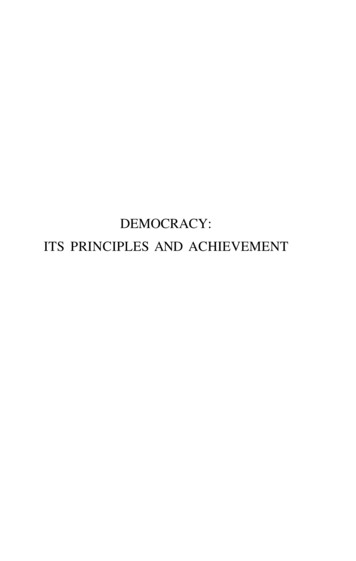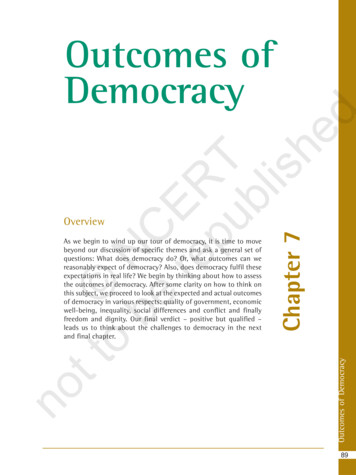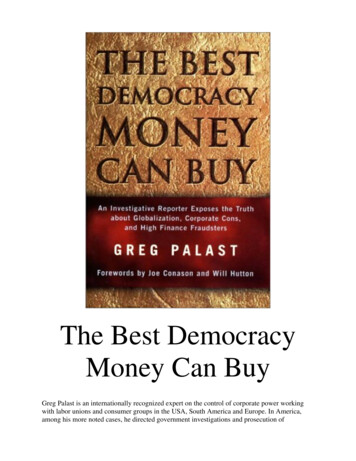
Transcription
The Best DemocracyMoney Can BuyGreg Palast is an internationally recognized expert on the control of corporate power workingwith labor unions and consumer groups in the USA, South America and Europe. In America,among his more noted cases, he directed government investigations and prosecution of
racketeering by nuclear plant builders and, for the Chugach Natives of Alaska, probed charges offraud by oil companies in the grounding of the Exxon Valdez.Five years ago, Palast turned his investigative skills to journalism. His 1998 undercover exposéof corruption at the heart of Tony Blair’s cabinet, “Lobbygate,” earned him the distinction ofbeing the first journalist in memory berated personally on the floor of Parliament by a primeminister—as well as an award for Story of the Year. His column for Britain’s Observernewspaper, “Inside Corporate America,” and other writings, have won him the Financial TimesDavid Thomas Prize (1997) and nomination as Business journalist of the Year (1999).In America, Palast broke the story of how Katherine Harris and Jeb Bush removed thousands ofBlack and Democratic voters from registration roles prior to the presidential election. The seriesof revelations appeared in The Nation, the Washington Post, Harper’s, the Guardian—and inSalon.com which named the exposé Politics Story of the Year. Palast’s investigative reports canalso be seen on BBC Television—“Newsnight’s own Sam Spade.”Publication of Democracy and Regulation, Palast’s lectures at Cambridge University and theUniversity of Sao Paulo, coauthored by Theo MacGregor and Jerrold Oppenheim, isforthcoming. He divides his time between London and New York.Some comments on Greg Palast’s writings:“The journalist I admire most. His amazing work puts all the rest of us journalists to shame. I’man avid reader of everything Palast writes—can never get enough of it.”George Monblot, Guardian“Hearsay and misinformation.”Official spokesman, International Monetary Fund (IMF)“Great writing on the Evil Empire of the IMF.”Jude Warmiski, former editorial page editor, Wall Street Journal“The world’s greatest investigative reporter you’ve never heard of.”Cleveland Free Times“To Americans who cannot read his stories printed in Britain’s Observer, he is America’sjournalist hero of the Internet.”Alan Colmes, Fox Television“Intrepid investigative reporter who first broke the news that tens of thousands of likelyDemocratic voters were disenfranchised in Florida before the 2000 election.”US journalism Hall of Fame“The Most Evil Man in the World.”Private Eye“Amazing reporting. I can’t wait for the next installments.”David Ruppe, ABC News
“The Liar! Sleaze Reporter!”Mirror“[Palast’s reports) have not one shred of evidence!”Prime Minister Tony Blair“Tony Blair’s nightmare.”Harper’s & Queen“George Bush’s nightmare.”Laura Flanders, Working for Change Radio“The information is a hand grenade.”John Pilger, New Statesman“Rubbish. rubbish.”Official spokesman, World Trade Organization (WTO)“Courageous writing (on the WTO)—when no one else will do it.”Maude Barlowe, Council of Canadians“The type of investigative reporter you don’t see anymore—a cross between Sam Spade andSherlock Holmes.”Jim Hightower“All power to Palast’s pen!”Will Hutton, author, The State We’re In“Should be read all over America.”Andrew Tobias, author, The Invisible Bankers“Greg Palast is investigative journalism at its best. No one has exposed more truth about theBush Cartel and lived to tell the story.”Baltimore Chronicle“Your Bullshit axe to grind with Bush is just another example of how far a punk ass loser will goto slander our president.”(Signed) “A Real American.”
THE BESTDEMOCRACYMONEY CAN BUYAn Investigative Reporter Exposes the Truth aboutGlobalization, Corporate Cons and High Finance FraudstersGreg PalastFirst published 2002 by Pluto Press 345 Archway Road, London N6 5AA and 22883 Quicksilver Drive, Sterling, VA 201662012, USAwww.plutobooks.comCopyright Greg Palast 2002The right of Greg Palast to be identified as the author of this work has been asserted by him in accordance with the Copyright,Designs and Patents Act 1988.British Library Cataloguing in Publication Data A catalogue record for this book is available from the British LibraryISBN 0 7453 1846 0 hardbackLibrary of Congress Cataloging in Publication Data Palast, Greg.The best democracy money can buy: an investigative reporter exposes the truth about globalization, corporate cons, and highfinance fraudsters / Greg Palast. p. cm.ISBN 0-7453-1846-0 1. Political corruption. 2. Corporations-Corrupt practices. 1. Title.JF1081 P35 2002364.1’323-dc2l2001008116We cannot trust some people who are non-conformists.Ray Kroc, chairman, McDonald’s Corp, deceasedThe thing about the Golden Straitjacket is, the tighter you wear it, the more gold it produces.Thomas Friedman on globalizationI don’t have to be nice to the spirit of the Anti-Christ.Dr (“Reverend”) Pat RobertsonContentsForewords by Joe Conason and Will Hutton . ix
Who Gives a Shit? An Introduction .11 Jim Crow in Cyberspace: The Unreported Story of How They Fixed the Vote in Florida .6In the days following the presidential election, there were so many stories of AfricanAmericans erased from voter rolls, you might think they were targeted by some kind ofracial computer program. They were.2 Sell the Lexus, Burn the Olive Tree: Globalization and its Discontents.44A cache of secret documents from inside the IMF, World Bank and World TradeOrganization explains the inner workings of the iron triangle of globalization.3 Small Towns, Small Minds.76I live in one of those lovely little rural villages in America that still preserve good oldAmerican small town virtues. So why has our local newspaper written two editorialsrequesting I get the hell out?4 Pat Robertson, General Pinochet, Pepsi-Cola and the Anti-Christ: Special InvestigativeReports .84Award-winning investigative reports.5 Inside Corporate America.115Fifteen thousand stockholders believe they hear Sam Walton speak months after hedied—and other strange tales from Planet Dollar.6 The Best Democracy Money Can Buy .140Who owns America? How much did it cost? Cash, check or credit card? The Bushes, theClintons and the billionaires who love them.7 Cash-for-Access—“Lobbygate”: the Real Story of Blair and the Sale of Britain .152My bald head took up the entire front page of the Mirror under the headline, ‘THELIAR!’ Did I upset someone? When Tony Blair came to power, I set up an undercoversting exposing the kasbah influence in 10 Downing Street.8 Kissing the Whip .182When the TV infotainment hypnosis wears off, when “Have a nice day” is an insufficientanswer to getting screwed by the powers that be, Americans can surprise themselves, riseup, and say, “No thanks, we won’t kiss the whip that beats us.” Thoughts in exile.9 Victory in the Pacific—A Conclusion .197Index .201ForewordsJoe Conason and Will HuttonWhen I first knew Greg Palast years ago in New York, he was an extraordinarily determined andtalented investigator, toiling away for a consortium of labor unions. Among the frustrations ofhis job was the necessity of explaining complex financial issues to doltish journalists. At somepoint since then, very much to the public benefit, he decided to pick up the pen himself and takeon the world.This fascinating book is really a world tour with Palast as guide. Those who join him will learnthe previously unrevealed secrets of globalization, a term which really is a new “brand name” forvery old forms of international investment and exploitation.Joining the techniques and values of investigative journalism with his background in economics,Palast scrutinizes the global marketplace in ways that enlighten readers and frighten corporatechieftains. It is a salutary occupation that brings a touch of moral hygiene to institutions that
badly need cleaning. Palast’s bracing hosedown is a rare experience for the denizens of thecorporate sector, who are accustomed to “business reporting” focused on stock prices andbalance sheets.It is ironic that we in the USA must turn to Britain for this American’s unfettered reporting aboutour businesses and institutions—including some of the most important stories about last year’sdisputed presidential election. Readers who think they can no longer be shocked by that assaulton democracy are. well, they’re in for a shock.Palast is a tough and salty character, but one wishes he weren’t quite so unique. A few morereporters chasing these stories with his passion and perspicacity might be able to change theworld.Joe Conason, New York Salon.com and New York ObserverThose in authority will not agree, but we need more Greg Palasts. Palast is instinctively on theside of the underdog, and knows that those with power and money are generally beingeconomical with the truth. A journalist to his quick, he also takes the view that news issomething that someone somewhere does not want in the public domain. Greg is determined toget it there.I first met him during the Observer’s famous scrape with authority over the Cash-for-AccessLobbygate scandal when I was editor. Greg had gone undercover to expose corporate lobbyists’influence on Tony Blair’s New Labour government, and his revelations were devastating (seeChapter 7). This was investigative journalism at its best brave, painstaking and more thanjustified by the results.His collection in this book is tribute to his techniques. As his reputation has grown so has theflow of the anonymous documents reaching his desk, again a tribute to the way he is seen bythose inside and outside authority. You are not sent documents unless the sender believes in yourcapacity to understand and use them to maximum effect. Greg can be relied upon for both.But Greg is not just an effective journalist dedicated to cocking a nihilistic snook at the powersthat be. He has the best of America’s commitment to genuine democracy and the ability of wellinformed citizens to make rational judgements and hold the powerful to account—if only theyhave the information. Greg does pretty well by himself, but if we had a dozen Palasts the worldwould be a very different place.Will Hutton, London Author of The State We’re InFor LINDA LEVY, whose work is here plagiarized without mercy.For video links to these stories, documentation and updates, go to www.GregPalast.comWho Gives a Shit? An IntroductionYou read the papers and you watch television, so you know the kind of spiderbrained,commercially poisoned piece-of-crap reporting you get in America. If you’re reading this inBritain, you stand a chance of getting some real information, but your news is so censored andtwisted in a knot that. well, that’s another story (read Chapter 8, “Kissing the Whip”).You could call this book: What You Didn’t Read in the New York Times.For example,
Five months before the November 2000 election, Governor Jeb Bush of Florida moved to purge57,700 people from the voter rolls, supposedly criminals not allowed to vote. Most wereinnocent of crimes, but the majority were guilty of being Black.I wrote that exposé for page 1 of the nation’s top newspaper. But it was the wrong nation,Britain. It ran in the Guardian and its Sunday sister paper, the Observer. You could see it ontelevision too, on BBC TV’s Newsnight, which airs my investigative reports.(Want to know what was in that diseased sausage called a presidential election? Read Chapter 1,“Jim Crow in Cyberspace”,which contains reports never printed in the US and new investigativematerial not yet reported on either continent.)There’s a lot more not printed in the US, barely seen in Britain. There’s the story aboutMonsanto’s genetically modified, milk-making hormone. It turns out, the company’s test cowsdripped pus into the milk buckets. Yummy. Monsanto fixed that problem the easy way—byburying test data. US officials helped out, slipping the company confidential regulatorydocuments. (See, “The Ignoble Prize in Chemistry”, in Chapter 5.)And you didn’t read about accusations from inside the FBI and CIA that, prior to September 11,2001, Bush’s national security chiefs killed investigation into Saudi Arabian billionaires’funding of terror networks.You didn’t read about how the “Reverend” Dr Pat Robertson secretly, illicitly used his ChristianCrusade jihad assets to boost his berserker get-rich-quick business schemes.Nor did you read about Anibal Veron, an Argentine bus driver. Last year, Veron hadn’t receivedhis pay for nine months, protested in the road and was shot dead. Demonstrators charged that theIMF had a plan to force Argentina to cut wages. Anti-globalization conspiracy theory? I’ll showyou the document. You’ll find Veron’s story in Chapter 2, “Sell the Lexus, Burn the Olive Tree:Globalization and its Discontents”. If you read the pro-globalization gurus such as ThomasFriedman or Anthony Giddens, you get the line that the New World Order is all about thecommunications revolution and cell phones that will call your broker and do your laundry at thesame time. Wow. And if you’re against it, you’re against the future. The kids in the streets arejust a bunch of unsophisticated jack-offs. That’s what you get in the media and, in the USespecially, there’s no dissent from this slaphappy view of globalization.I’m not going to argue with Friedman and Giddens and the guys in favor of The Future. What Iwill do is show you documents: Country Assistance Strategies, an Article 133 diplomatic letter,the GATS committee memos. Most are marked “confidential”, “not for public disclosure”—andwalked out of filing cabinets inside the IMF, World Bank, World Trade Organization and relatedagencies you’ve probably never heard of.There’s nothing in those documents about mobile phones for the Incas. Rather, there’s a lotabout raising water prices and what one insider described as “The IMF riot”, the social explosionthe World Bank expects and figures into its plans.Not all of my work is so grim. In July 1998, I was in London and caught the front page of theMirror, one of Britain’s biggest-selling papers. The whole front page was a picture of this nastylooking bald guy—me—under a four-inch-tall headline: THE LIAR. And I thought, “Damn, itdoesn’t get any better than this.’I didn’t have time to enjoy it: my deputy editor and Prime Minister Tony Blair and my wife wereall planning my punishments, for varied if related reasons. (See Chapter 8.) The Mirror did notlike a story I had written with Antony Barnett for the Observer. To get the story, I’d goneundercover and exposed a stinky little deal-making operation running through Blair’s cabinet.That story “Cash for Access—Lobbygate” grew out of this idea: Why not apply the techniquesof investigations I’ve conducted in government racketeering cases to news reporting? This wouldbe a quantum leap in dig-out-the-facts methodologies rarely used even by “investigative”journalists. That’s what makes these writings a bit different—lots of facts, many from documents
thought by their writers to be hidden away in desk drawers, from missent faxes and from taperecordings made when big mouths didn’t know who they were talking to.If Britain’s government was selling its nation, corporate America was buying. That’s my mainbeat: “Inside Corporate America”, the title of my column in the Observer. Those columns—updated, all fresh material—are in Chapter 5—There you will get, for example, the skinny onWal-Mart (“What Price a Store-gasm?”) and the tale of the strange little deal cut by a big-timeenvironmental group and the number one lobbyist representing polluters (“How the Filth TradeTurned Green”).So why have you not seen these stories, or few? Take that story of the theft of the US election. InAmerica, editors looked at their shoes and whistled—and hoped it would go away. Though noteveryone ignored it: I got lots of letters like this one: “Stay out of our politics, you English pig!”I hate to quibble, but I’m not British.I’m from Los Angeles. Actually, the scum-end of LA, in the San Fernando Valley, raised in apastel house between the power plant and the city garbage dump. It was not as glamorous asabject poverty, but not far above it. Half the kids in my school were Mexican-American and,brown or white, we were pretty much tagged as America’s losers. You graduated, workedminimum wage at Bob’s Big-Boy Burger on Van Nuys Boulevard, got your girlfriend pregnantand, if Vietnam didn’t kill you, overtime at the Chevy plant would.America was a carnivore and we were just food. Anyway, I got out and so did my sister—howwe did is neither interesting nor remarkable.Am I bitter? Why shouldn’t I be when I look at the privileged little pricks that call the shots onthis planet, whose daddies could make the phone calls, write the checks, make it smooth? DaddyBush, Daddy Koch, Daddy Bin Laden—I’ve got a list.As a scholarship kid at the University of Chicago, I witnessed the birth of the New WorldGlobalization Order. It was the mid-1970s and I’d worked my way into Milton Friedman’spostgraduate seminar and into a strange clique, which later became known as the “ChicagoBoys”. That was the little cabal of South America’s budding dictators and “neoliberal”economists who would turn Chile into an experiment in torture and free markets.Even then I was undercover, working for Frank Rosen, head of the United Electrical WorkersUnion, and Eddie Sadlowski, the dissident steel workers’ leader, for a greater purpose I couldonly dimly understand.I avoided journalism. Starting in 1975, from a desk in the basement of the electrical workers’union hall, I began grinding through account books of US corporations. Using their own abstrusefinancial codes, I challenged gas company heating charges. I negotiated contracts for steel andiron workers. I was broke and I was in heaven. My dad had been a furniture salesman. He hatedfurniture. If it were up to him, we would have eaten sitting on the floor. Mom worked in theschool cafeteria (you know, hairnet and creamed corned) until she. became a hypnotist forMcDonald’s (really—see Chapter 3). From them, I gained a deep and abiding fear of working fora living.Bang: One minute I was this dead-broke anti-corporate scourge with his head buried inbureaucratic file cabinets—and the next I was “America’s number one expert on governmentregulation bar none” (I read that in the papers), with an office bigger than God’s hairpiece on the50th floor of the World Trade Center in New York City, giving lectures in Sao Paolo.Still, I kept my nose in the dusty files. I found things like this: Executives of a megalith powercompany, Long Island Lighting of New York, swore under oath that their nuclear plant wouldcost 1.8 billion. Internal confidential memos said the plant would cost 3.2 billion. I convincedthe government to charge them with civil racketeering, and a jury said they should pay 4.8billion. Then, the governor of New York, a slick operator named Mario Cuomo, called the chieffederal judge in New York and poof!—the jury’s verdict was thrown out. That’s when I learned
about love, and that there is no love greater than the love of politicians for the captains offinance.So am I bitter? See above.Then I quit. It was during my investigation of the Exxon Valdez crack-up (see Chapter 4). 1 wasworking for the Chugach natives of Alaska. Our team quickly discovered the oil spill was noaccident: before the tanker’s grounding, Exxon shut off the ship’s radar to save money and aBritish Petroleum affiliate had faked the safety equipment reports.That’s when I realized, from a kyak in the Prince William Sound, who can hear you scream? Thepress had f-d up the Exxon Valdez story something awful. That was five years ago. I decidedfrom then on I’d write these stories myself, an idea immediately encouraged by the Guardian’sAlex Brummer, the Observer’s Will Hutton and Ben Laurance (all since moved to more lucrativevenues), then producer Meirion Jones at BBC’s Newsnight.While American journalists spent those years smothered in Monica Lewinsky’s panties, I had theluxury of diving into the filing cabinets of the Reverend Pat Robertson, the World TradeOrganization and George Bush’s favorite billionaires.Not all my work is undercover gumshoe stuff. For those hungry for the grand theory behind allthis journalism, Pluto Press is issuing a companion policy book, Regulation and Democracy, incooperation with the United Nations International Labor Organization, which grew out of mylectures at Cambridge University and the University of Sao Paolo. Theo MacGregor and JerroldOppenheim are co-authors.So where are you, America? Don’t you want to know how your president was elected? How theIMF spends your money?I got a hint of the answers from Mike Isikoff, a reporter with the Washington Post Newsweekgroup. A couple of years ago, he passed me some truly disturbing information on PresidentClinton, not the usual intern-under-the-desk stuff. I said, “Mike, why don’t you print this?” Andhe said, “Because no one gives a shit.But if you’re one of the few who do, here’s your book.[Chapter] 1Jim Crow in Cyberspace: The UnreportedStory of How They Fixed the Vote in FloridaIn the days following the presidential election, there were so many stories of African-Americanserased from voter rolls you might think they were targeted by some kind of racial computerprogram. They were.Silence of the Lambs: American journalism Hears No Evil,Sees No Evil, Reports No EvilHere’s how the president was elected:In the months leading up to the November balloting, Florida Governor Jeb Bush and hisSecretary of State Katherine Harris ordered local elections supervisors to purge 57,700 votersfrom registries on grounds they were felons not entitled to vote in Florida. As it turns out, thesevoters weren’t felons, at most a handful. However, the voters on this “scrub list” were, notably,
African-American (about 54 per cent) and most of the others wrongly barred from voting werewhite and Hispanic Democrats.Weeks after the election, first reports of this extraordinary news ran, as they should, on page 1 ofthe country’s leading paper. The country: Britain. In the US, it ran on page 0—the story was notcovered on the news pages. The theft of the presidential race in Florida was also given bigtelevision network coverage. But again, it was on the wrong continent: on BBC television, inLondon.Was this some off-the-wall story that the British press misreported? The chief lawyer for the USCivil Rights Commission called it the first hard evidence of a systematic attempt todisenfranchise Black voters; and the Commission held dramatic hearings on the evidence.So why was this story investigated, reported and broadcast in Europe, for God’s sake?I’d like to know the answer. That way I could understand why a Southern California ho’daddywith his wife and kiddies has to commute to London to tell this and other stories about mycountry. How did 100,000 US journalists sent to cover the election fail to get the vote theft storyand print it (preferably before the election)? Investigative reports share three things: they arerisky, they upset the wisdom of the established order and they are very expensive to produce. Doprofitconscious enterprises, whether media companies or widget firms, seek extra costs, extrarisk and the opportunity to be attacked? Not in any business text I’ve ever read. I can’t help butnote that my paper, the Guardian and its Sunday sister, the Observer, are the world’s onlyleading newspapers owned by a notfor-profit corporation, as is BBC television.But if profit-lust is the ultimate problem blocking significant investigative reportage, the moreimmediate cause of comatose coverage of the election and other issues is what is laughablycalled America’s “journalistic culture”. If the Rupert Murdochs of the globe are shepherds of theNew World Order, they owe their success to breeding a flock of docile sheep—the editors andreporters snoozy and content with munching on, digesting, then reprinting a diet of press releasesand canned stories provided by officials and corporation public relations operations.Take this story of the list of Florida’s faux felons that cost Al Gore the presidential election.Shortly after the UK story hit the world wide web, I was contacted by a CBS TV network newsproducer ready to run their own version of the story. The CBS hotshot was happy to pump mefor information: names, phone numbers, all the items one needs for a quickie TV story.I also freely offered up to CBS this information: the office of the Governor of Florida, Jeb Bush,brother of the Republican presidential candidate, had illegally ordered the removal of the namesof felons from voter rolls—real felons, but with the right to vote under Florida law. As a result,another 40,000 legal voters (in addition to the 57,700 on the purge list), almost all Democrats,could not vote.One problem: I had not quite completed my own investigation on this matter. Therefore, CBSwould have to do some actual work, reviewing documents and law, obtaining statements. Thenext day I received a call from the producer who said, “I’m sorry, but your story didn’t hold up.”Well, how did the multibillion dollar CBS network determine this? Answer: “We called JebBush’s office.” Oh. And that was it.I wasn’t surprised by this type of “investigation”. It is, in fact, standard operating procedure forthe little lambs of American journalism. One good, slick explanation from a politician orcorporate chieftain and it’s case closed, investigation over. The story ran on television anyway: Ireported it on the BBC’s Newsnight.Let’s understand the pressures on the CBS TV producer that led her to kill the story on the basisof a denial by the target of the allegations. The story required a massive and quick review ofdocuments, hundreds of phone calls and interviews, hardly a winner in the slam-bam-thank-youma’am US school of journalism. Most difficult, the revelations in the story required a reporter tostand up and say that the big name politicians, their lawyers and their PR people were freakingliars. It would be much easier, a heck of a lot cheaper and no risk at all to wait for the US Civil
Rights Commission to do the work, then cover the Commission’s canned report and pressconference. No one ever lost their job writing canned statements from a press release. Wait!You’ve watched Murphy Brown or The Front Page so you think reporters hanker every day touncover the big scandal. Bullshit. Remember, All the President’s Men was so unusual they hadto make a movie out of it.Meanwhile, back in sunny England.My paper received about 2,000 bless-you-Britain-for-telling-us-the-truth-about our-electionsletters from US Internet readers circulating the samizdat presidential elections coverage. And Ireceived a few like this:You pansey brits seem to think that the average American is as undereducated and stupid as theaverage british subject. Well comrad, I’m here to tell you.which ended with some physically unfeasible suggestions of what to do with the Queen.Meanwhile, back in the US.Salon.com, the Internet magazine, ran my story on the theft of the elections. It wasn’t exactly“print”, but at least it was American. And now columnists like Bob Herbert of the New YorkTimes picked it up, and some radio talk shows. but still not one news editor called, not evenfrom my “sister” paper, the Washington Post, with whom the Guardian shares material.From a news view, and the flood of site hits, this was Salon’s biggest politics story ever—andthey named Part I their political story of the year. But where was Part 11? On their web-site andon radio programs the magazine was announcing Part 11 would appear in two days. and in twodays. and in two days. and nothing appeared. Part 11 was the story blown off by the CBSNightly News about an additional 40,000-plus voters whom Jeb Bush barred from voting. Thefact that 90 per cent of these 40,000 voters were Democrats should have made it news. becausethis maneuver alone more than accounted for Bush’s victory.I was going crazy: Gore had not yet conceded. the timing of Part 11 was crucial. Where the hellwas it? Finally, an editor told me, “The story doesn’t check out. You see, we checked with JebBush’s office and they saidAgh! It was deja vu all over again.Another staffer added, as a kind of explanation, “The Washington Post would never run thisstory.”Well, he had me there. They hadn’t, they didn’t. Not yet. At least Salon helped me sneak the firstreport past the border patrols. So God bless America. While waiting for America to awaken, Itook my BBC film crew to Florida, having unearthed the “smoking gun” documents proving thatFlorida’s Republican officials had knowingly knocked thousands of innocent Black voters offthe Florida voter roles before the election. I had a page marked “confidential” from the contractbetween the state of Florida and the private company that had purged the voter lists. Thedocument contained cold evidence that Florida knew they we
Greg Palast is an internationally recognized expert on the control of corporate power working with labor unions and consumer groups in the USA, South America and Europe. In America, . Palast broke the story of how Katherine Harris and Jeb Bush removed thousands of . This fascinating book is really a wo

